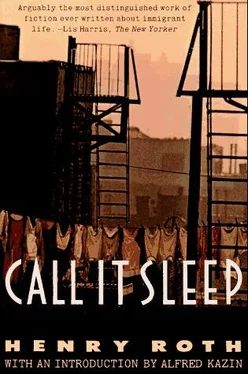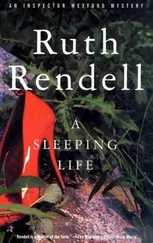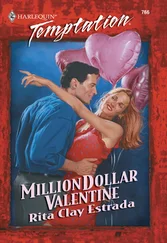“Naturally!”
“Why does it get so you can’t make a hole any more — even with an umbrella. A broken one I saw. Only sparks when you hit it.” He ducked under the hungering, round eyes. “You talk now.”
“No, you!”
“Aaaaa!”
“Won’t you?” she coaxed.
“I’m all finished now — with my bread,” he reminded her crossly.
“Do you want some more? Some milk?” The eager intensity with which her words followed one another seemed to squeeze letters out of syllables.
He shook his head, eyed her obliquely.
“You can stay with me for a while, beloved.” She opened her arms for him to come to her. “You don’t have to go down.”
He drooped, pouted, but finally trudged over to her and settled on her knee. All this time he had wanted very much to go down, to escape, but he had again caught a sound of pleading in her voice, an expectancy.
“I–I’ll stay here.”
“Oh, you do want to go down!” She unlocked her arms. “Yes you do! I’ve been keeping you. Come! I’ll get your coat!”
“No! No! I don’t! No, mama! I just — I just wanted to look out of the window. That’s what I wanted.”
“Is that all? Are you sure?”
“Yes. Only open. It has to be open.” Some condition was necessary to justify his hesitance. “Will you open it?”
“Of course!” She suddenly pressed him to her fervently, rocked him against her breast. “What would I do without my son in bitter hours? My son! But, darling, the window with the fire-escape before it. Not the other. Good? Sweet fragment! I’ll get a pillow for you to lean on. Do you want to go now?”
“Yes.” He squirmed free.
“First your sweater then. It’s cold out.”
She fetched it. And when he had pulled it on, both went up to the front-room where she opened the window before the little fire-escape, pulled the heavy white curtains aside, cleared the sill of pots and milk bottles and placed a pillow on it.
“And this you’ll want to kneel on.” She drew a chair up. “It can’t damage it any and you can look out much better. Your mittens?”
“No. I’m not cold.”
She leaned over his shoulder, sniffed the air. “It drills the nostrils. Do you see how blue it’s gotten over there, over those brown houses. How early! In the summer this would be late and Albert soon—” She stopped. The fingers on his shoulders twitched. “Ach! I threw a stone upon my own heart then!” With a slack and suddenly aimless hand she fondled his ears and the nape of his neck. “One cannot hide himself long from his fear.” She groaned softly and began drumming on the window pane just as she had drummed on the table yesterday and the day before. “Will you knit another dream for me if I come up later? No?” She patted his head and walked slowly from the front room.
Moodily, he leaned further out to stare down the street.
On the right there were children near the stores at the end of the block, girls skipping rope. Annie was turning. He could see the brace. When he squinted tightly he thought he could make out Yussie standing beside the boy on a tricycle, but wasn’t quite sure if that really was Yussie. Then he could have gone down and stayed near the house without being molested. It would have been better than just being half in the street and half out. He wondered why it was that one could be half in the street and half out and yet never be able to picture the street and the inside of the house together. He could picture the street and the yellow wall of his house, but not the inside. Once he had seen men tearing down the wall of an old wooden house. You could see the inside from the street — the wall paper and the chandelier, the black thickness between floors, windows, open doors. It was strange. Everything looked shrunken. Everything looked frightened.
There was a shout down the street. The boy on the tricycle had begun pedaling followed by the other who alternately propelled or jumped on the axle between the rear wheels. It was Yussie. They swerved, jounced off the curb onto the gutter, circled careening, zigzagged tipsily and bucked the curb again. With a feeling of jealousy he strained his ears to catch what Yussie was shouting between shrieks of laughter. He wouldn’t give Yussie a ride if he had a wheel. Never. He wouldn’t even stay in this block. No, he’d go far away. Where, far? He’d get lost again. The thought sent a shiver through him. Not this time though. His mother would write the address down for him and he’d carry it with him always, in his pocket. They wouldn’t fool him again. He’d ride away. Maybe after those telegraph poles, if you went way, way on, there was a place like a picture in the candy store. That lady who stood on a big box of cigarettes and wore a handkerchief under her eyes and funny fat pants without a dress and carried a round sword. A place where those houses were that she lived in, that all ended in sharp points. He had seen a man in a hat once like that, with a sharp point. He had a mustache and was in the Jewish paper his mother bought. The Tageblatt! When he went that night and — No! Lost the money — No! No! And — and! No!.. Houses, he was saying. Points. Points they had, yes, not corners on top like those across the street. Yellow and old wood corner. Brown and green corner. And the grey one with the little window in it that looked like the roof was going to be a star — went down and then didn’t go so down. Why?
He couldn’t answer it, and stared again at the two on the tricycle. Yussie had gotten off, and the owner, his feet removed from the whirling pedals was letting the other push him as fast as he could. The peaks of their caps were turned backwards. Tooting breathlessly they bounced swiftly over the pitted gutter toward David’s house. They were racing. He could tell by their caps. And as they drew near, the driver’s shrill, spurring, “We’re beatin’! We’re beatin’! Horry op!” sent the blood tingling through his own veins. They were almost in front of the house now. In another moment, they would pass beneath his window — when suddenly with a sharp scrape of sliding shoes, Yussie braked the flying wheels to a stop and gaped over the other’s shoulder. Wonderingly, David turned his head to the left to follow his gaze.
Only a few yards off, a tall, lean stranger approached, stooping slightly and bearing close to his dark coat, a white parcel, high, as though he meant to proffer it to the two boys before him. An instant David stared, and suddenly in the space of one stride, it was neither stranger nor parcel he saw, but his own father, and the right hand against his coat was hanging from a sling and swathed in bandages. He screamed.
“Papa! Papa!”
The slow head lifted, grim jaws, beaked nose and steady-glaring eyeballs. The two boys astride and beside the wheel sidled out of his way. David flung himself back from the window, fled screaming into the kitchen. His mother was already on the stair, frightened—
“David! What is it!”
“Papa’s coming! His hand! His hand! It’s all in”—He circled his own. “All in white! He’s coming!”
“Dear God! Hurt! He’s hurt?” She shook him. The starting brown eyes seemed to waken the pallor of her skin, the clutching hand among her hair its bronze. “Albert!” She flew to the door. “Albert!” Her voice in the hallway was hoarse. “Albert! Albert!”
To David, crouched back against the frontroom stairs, his father’s harsh, suppressed words snapped through the open doorway.
“Hush! Hush, I say! An end to your wailing! Get back!”
“Blood! Blood!”
Moaning, clawing at her cheek, his mother came in — backwards held at arm’s-thrust by his father. His face was grey, so grey the bluish stubble on his hard and bulging jaws stood out in separate dots. On the thick white bandage around his hand, a red spot glowered where the thumb should be.
Читать дальше












